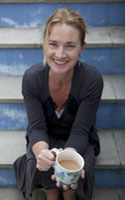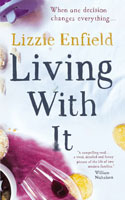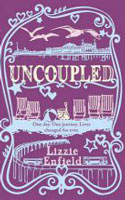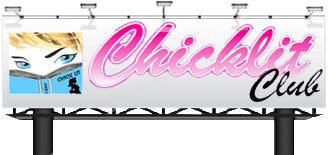INTERVIEW
July 2014

LIZZIE ENFIELD
Lizzie Enfield is a British journalist and creative writing teacher. She is the author of Uncoupled, What You Don’t Know and her latest, Living With It. (Interview by Jade Craddock)
Return to interview list
-

1. What three words would you use to describe your latest book Living with It?
Modern morality tale.
-
2. Where did you get the inspiration for the novel?
It arose from the MMR controversy and knowing lots of people who had not had their children vaccinated because of it. This suggested various “what if?” scenarios, including the one I explore in the novel.
-
3. How did the controversy about the MMR vaccination affect how you approached and wrote about the subject?
It affected me only in that I hesitated more than I otherwise would have done, before having my own children vaccinated. But when I wrote the book, I wanted to make it as balanced as possible, to look at both sides and take into account the very real fears and concerns that all parents have when it comes to their children.
-
4. A lot of the bad press about the MMR was about the consequences of getting the vaccination, but your novel is about the possible consequences of not having it. Was it important to you to show it from the other side?
One of the main themes of the book is fear and fear is not a rational emotion. At the time people were scared of autism, which seemed to be on the increase, whereas measles, because of the success of the vaccination programme, was almost forgotten. But measles was still a real risk, as the 2012 outbreaks, in which at least one person died, demonstrated.
-
5. Each of your four main adult characters has very different reactions and experiences in the novel. Did your sympathies change as you wrote the novel and was there any particular character you found most difficult to relate to?
I suppose initially I found Isobel hard to relate to but my sympathies for her and the predicament she found herself in grew as I began to develop her character and her back story. Ben was a little too angry for me, at the start, but I knew where I was heading with him, so he was easier to understand. Ultimately, I found Eric the most problematic because he was so unsupportive of Isobel, albeit he was in an impossible position; caught between his wife, his friend and his own opinions. What I found most interesting writing the book was that I began to question myself and how I might have behaved in a similar situation and I found I really didn’t know.
-
6. How much of Ben’s reaction do you think is borne out of his past with Isobel - would it have been quite the same if it had been Yasmin or Sally?
That’s a good question. I think it had a lot to do with his past but I had not really thought how it might have differed had one of the others caused the problem. I think it is very common, initially anyway, when people discover there is something wrong with their child to want someone or something to blame – hence people falling on (anti-vaccination campaigner) Andrew Wakefield’s report, when it came out. So perhaps Ben would still have looked for and found a reason to blame another had the situation been slightly different.
-
7. Is Maggie really as accepting and collected as she appears or should we read more into the ending?
That’s hard to answer without making readers want to jump to the ending – don’t! I think Maggie, like a lot of women, is pragmatic and wants to focus on her child rather than waste energy elsewhere.
-
8. You deal with a number of issues in the novel - not only Iris’ deafness, but Conrad’s autism and Harvey’s nut allergy. Was it important for you to show that Ben and Maggie aren’t alone in having to deal with disability and illness?
It was important to show that all the characters have different things to live with and different reasons for behaving in the way they do. Nothing in life is simple or straightforward and often the choices we make are driven by our own peculiar set of circumstances. It’s too easy to point the finger and say “I’d never do that” but, given a different set of circumstances, we none of us really know what we would do.
-
9. The novel throws up the difficult decision parents have to make. As a parent yourself how have your own experiences compared?
Not at all, thank goodness! I have three children. My middle one was vaccinated at the height of the MMR controversy and I did not find it an easy decision but I also grew up with someone who was deaf from having had measles, so I was mindful of the risks getting the disease would pose.
-
10. What do you hope readers take from the book?
I hope it will make people questions their own beliefs and assumptions and pause to think about the potential repercussions of decisions they make.
-
11. You’ve written three very different novels - how do you think your writing has developed and have your priorities as an author changed?
I feel more confident in my ability as a writer now than I did when I started, so I have tried to be more ambitious with this novel and set out to explore some difficult questions. But I still wanted tell a compelling and entertaining story and create characters that readers care about.
-
12. Does writing come naturally to you or is it something that you work at?
It comes naturally but I still have to work at it as what comes at first isn’t always any good! I think that’s true for all writers. It’s a process of getting something down initially and then trying to turn that into something good.
-
13. Which writers inspire you?
Anne Tyler, for her ability to turn very ordinary stories into extraordinary ones. Fay Weldon, for her wit and inventiveness, Martha Gelhorn, for her brave journalism, Kate Summerscale and Hilary Mantel for making history so real. Charlotte Bronte, Jane Austen, George Elliot… Lots of male writers too: Nathan Filer, Mark Haddon, William Nicholson, Dickens, Tolstoy… Not sure where to stop!
-
14. What’s the best thing about being an author?
Getting to hold the first copies of a new book. It’s a bit like having a new baby or, if my memory serves me right, a new boyfriend. I can’t quite believe they are mine and need to keep shooting them sidelong glances to see if they are really there! But also stimilating discussion and prompting people to ask questions. I think fiction is as good a medium as journalism for social commentary, whilst hopefully entertaining people at the same time.

